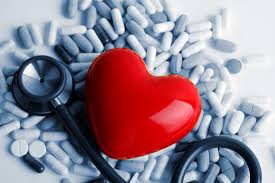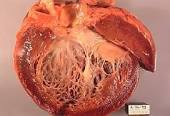Early detection of chemotherapy-induced cardiotoxicity is crucial in order to prevent irreversible cardiac dysfunction, which occurs in more than one third of patients
“Early detection is crucial…” You can’t make it any clearer. So how did well-trained, experienced oncologists not detect my chemotherapy-induced cardiotoxicity? First, a little background.
On September 14th, 1995 I received High-dose cytoxan/cyclophosphomide = 4.5 grams per meter squared, total dose being 10.5 grams in one litre of normal saline over six hours. I received the the same dose a couple of weeks later.
On December 16th, 1995, as part of my ASCT I received another dose of cytoxan- nine (9) grams intravenous over seven hours.
In total, I received five different chemotherapy regimens that are known to be cardiotoxic- Including:
- Melphalan
- Busulphan
- Cytoxan aka cyclophosphamide
- Adriamycin
If you have undergone cardiotoxic chemotherapy or have undergone any radiation anywhere near your heart, my guess is that you will develop cardiomyopathy symptoms some day.
My heart was normal for exactly 15 years after the completion of several months of chemo that was sure to damage my heart.

The good news is that a number of evidence-based non-conventional heart health therapies have stabilized my chemotherapy-induced cardiomyopathy.
While I don’t want this post to focus exclusively on heart supplementation, I have to admit that CoQ10, Cocoa, Vitamin D3, Curcumin, others have made a tremendous difference to stabilizing my heart.
I’m coming up on surviving cancer for 30 years and surviving chemotherapy-induced cardiomyopathy and atrial fibrillation for about half of that overall survival.
Where will my heart health end up? I would be naive if I didn’t acknowledge that while my heart is stable, I live with an increased risk of many different heart problems including
- heart attack
- stroke
- blood clot
- aortic rupture
etc. My goal is to continue my heart healthy lifestyle for as long as I can. Check back with me every now and then and I will give you an update on my heart health.
Have you had chemotherapy-induced cardiotoxic chemo regimens? To learn more about evidence-based, non-conventional therapies, scroll down the page, post a question or comment and I will reply to you ASAP.
To learn more about chemotherapy-induced cardiomyopathy- click now
Hang in there-
David Emerson
- Cancer Survivor
- Cancer Coach
- Director PeopleBeatingCancer
“New research suggests that the widely used chemotherapy drug doxorubicin (Adriamycin) may cause heart toxicity, potentially leading to congestive heart failure.
Doxorubicin is a chemotherapy drug commonly used to treat certain types of cancer, such as breast, bladder, stomach, lung, and ovarian cancer. Sometimes, it is also used to treat cancer of the uterus…
How doxorubicin affects the heart, spleen
Halade and colleagues treated 2-month-old, cancer-free male mice with either a high or low dose of the drug. The researchers also treated a group of control mice with saline solution.
After sacrificing the rodents, the team studied the effects of the drug on their organs and tissues.
Doxorubicin caused fibrosis of the heart, in which the heart’s walls stiffen and cannot contract as much. This, in turn, causes the heart to malfunction. As a result, the mice’s hearts couldn’t pump as much blood as they should.
The drug also induced programmed cell death and caused the heart and spleen to shrink…”
“Early-onset cardiomyopathy induced by doxorubicin (DOX) occurs during the year after the completion of chemotherapy. Late-onset DOX-induced cardiomyopathy, which occurs later than a year after chemotherapy has been completed, has been reported chiefly in pediatric populations.1 The late-onset cardiomyopathy presents in approximately 1.6% to 5% of patients,2 most of whom have normal cardiac examination results before and just after chemotherapy. Early detection of chemotherapy-induced cardiotoxicity is crucial in order to prevent irreversible cardiac dysfunction, which occurs in more than one third of patients.3 Here, we present the case of a woman in whom DOX-induced cardiomyopathy occurred 17 years after chemotherapy…”
“The cardiac effects of chemotherapeutic regimens using high doses of cyclophosphamide (180 mg/kg over four days) were assessed in 32 patients with hematologic malignant neoplasms. Left ventricular systolic function, determined by the fractional shortening on echocardiogram, declined substantially five to 16 days after the initiation of cyclophosphamide therapy.
Although pericardial effusion on echocardiogram occurred in 33% of the patients studied, ECG voltage decreased five to 14 days after beginning cyclophosphamide therapy even in those patients without pericardial effusion.
- Congestive heart failure was noted in nine patients (28%) within three weeks of cyclophosphamide administration.
- Six of these patients (19%) died of myocardial failure.
- Pericardial tamponade occurred in six patients (19%), including five who died of myocardial failure.
Histopathologic and electron microscopic findings showed endothelial injury and a hemorrhagic myopericarditis. Cyclophosphamide in this high dose is associated with a toxic, often fatal, pericardiomyopathy. Depression of ECG voltage and systolic left ventricular function, though common, do not necessarily predict clinical cardiac deterioration…”
1 AUGUST 1981
“Doxorubicin and daunorubicin can cause dose-dependent cardiomyopathy in children and adults (1, 2). Risk factors that predispose patients to cardiomyopathy include advanced age, previous radiotherapy to the mediastinum, and concurrent cyclophosphamide therapy (2). A form of anthracycline-induced cardiomyopathy has also been reported (3). This acute cardiomyopathy may manifest as pericarditis-myocarditis, acute left ventricular dysfunction, arrhythmia, and myocardial infarction (3). The risk factors for this acute anthracycline cardiomyopathy are not well defined; however, large doses of doxorubicin over short periods may predispose patients to this toxicity (4)…”
“This paper reviewed drugs that cause DICT, the clinical manifestations and laboratory tests, as well as the related content of genetic variations associated with the risk of DICT, and further discussed the implication of new technologies in pharmacogenomics of DICT…”




